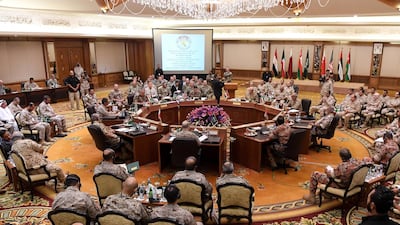President Donald Trump has backed plans to offer a Middle East Security Alliance (MESA) to members of the GCC supportive of America’s stand on Iran, a proposal that is expected to be discussed behind the scenes at the UNGA meetings in New York.
Diplomats see the evolving position of Washington towards a new core group as a product of the Iran situation but also a plank of the Middle East peace process review undertaken by Mr Trump’s son-in-law Jared Kushner.
“It’s encouraging to us that something like an Arab Nato could be on the table to help provide a context for US involvement in regional security,” one Middle East diplomat said.
While Mr Trump has been confrontational in his handling of the European partners in the North Atlantic Treaty Organisation, officials suggest the model can inspire a new formation in the region.
The Gulf Cooperation Council (GCC) has retreated into the shadows since the boycott of Qatar by its neighbours came into force in 2017. While the GCC secretariat still functions and Kuwait has been tireless as the rotating chair, there have been effects stemming of Qatar’s failure to respond to concerns over its support for terrorism and its promotion of extremism.
The issue of Iran is set to dominate the UNGA summit. If there is to be a convergence of ideas around a MESA agreement that will create a moment of truth for Qatar, which shares the North Dome natural gas deposit with Tehran.
Officials said the proposed MESA partners, Egypt, Saudi Arabia, UAE and Bahrain, would represent a strong consensus on Iran if the US wanted to pull the grouping together.
Since pulling out of the 2015 nuclear deal with Iran earlier this year, Mr Trump has moved swiftly to put the Iranian economy under sanctions pressure. The policy has been far more successful in isolating the Iranian economy than the naysayers predicted.
Richard Nephew, an Iran expert at Colombia University, has predicted that the only Western businesses in a position to continue trading with Iran will be small and medium sized enterprises based in Europe.
Projections of a steep drop off in Iran oil exports after a second round of sanctions in November will push the pressure on the regime even higher. At UNGA commercial ties across the Gulf will naturally be a focus for the White House as President Trump holds meetings before and after he chairs a special session of the Security Council on the issue.
“Any country that is a source of financing for Iran is going to see its position fall on Trump’s deaf ears,” said Olivier Guitta, managing director of GlobalStrat, an international risk consultancy. “Iran is for him the main thing. Those states with most to lose are those doing business with Iran.
“Qatar has a lot to lose because they are going to be under pressure to cut off their good relations with Iran, which in turn could affect the gas field, if they want a hearing from Trump.”
Anwar Gargash, the minister of state for foreign affairs, revealed last week that the UAE hoped Arab Gulf states would be party to proposed US negotiations with Iran on a treaty to curb its nuclear and missile programmes. He was speaking after the top US official for Iran affairs, Brian Hook called for talks on a new treaty between Iran and the US.
_______________
UNGA 2018:
Everything you need to know about the 73rd Session of the UNGA
UN General Assembly General Debate 2018 schedule
Donald Trump to address weapons proliferation and drugs at UN General Assembly
_______________
The UNGA meetings in 2017 saw a strong international debut for Saudi Arabia's Vision 2030, the vehicle for the reform programme spearheaded by Crown Prince Mohammad bin Salman. The Misk forum will again be a showcase for the rising process of economic reform and modernisation in the GCC. The region will also seek to share its leading role in brokering the push for peace between Eritrea and Ethiopia as well as the wider mediation of frictions across the Horn of Africa.
A lot has changed in the year since the UN countries last gathered in the Big Apple. For the region the US agenda on Iran looms above all else.
As Mr Guitta points out the removal of Rex Tillerson as US secretary of state as the Iran policy shifted changed the dynamic of the relationship with the GCC countries. “Pompeo and Mattis are focused on Iran and getting the kind of cooperation they need to put Iran under pressure,” he said. “They are fine as long as they are getting cooperation on Iran.”

